When it comes to surviving a long-term disaster situation, one of your top survival priorities is going to be food. While having a stockpile of long-term food and water is definitely a good start, no preparedness plan is complete without having a way to restock your goods during a long-term emergency. That means you need to start thinking about food procurement skills like survival gardening, hunting and fishing.
As many of you who follow me probably know, I’m an avid fisherman. In fact, I have another site that is dedicated to all things hunting and fishing related: CountryHookers.com.
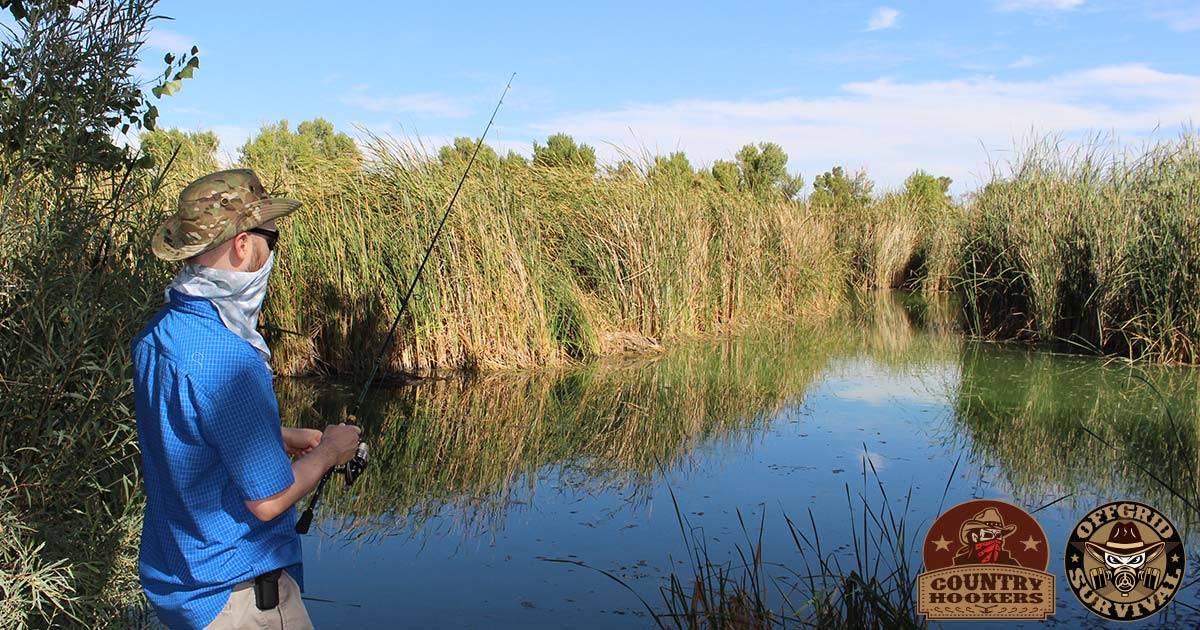
During a long-term survival situation, one where infrastructure shutdowns threaten your food supply, you need to be able to feed your family when things start getting tough. Fishing can be a great way to supplement your food supply, even if you live in an urban environment.
In many of these survival fishing articles, you’ll often see people talk about traps and Trotlines — I’ll talk a little bit about that — but the main thing I’m going to cover here is fishing behaviors and patterns. If you understand the fundamentals of how fish behave, and how things like weather patterns and time effect them, then you’re going to have a much easier time procuring food when you really need it!
Top Tips for Survival Fishing when the SHTF
Fishing Tips from the Pros
On my site Country Hookers, I have written a number of articles that featured tips from some of the top anglers in the country. While these fishermen often use their skills to win competitions, studying their techniques can help become a better fisherman and give you a good idea where to look during a survival situation.
Look for Cover & Look for Changes
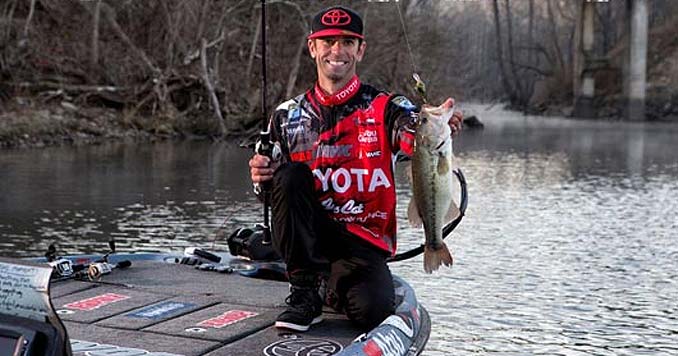
Team Toyota Angler, Mike Iaconelli says that no matter what type of fish you are targeting, you need to look for two things: Cover and Change.
“The biggest tip I can give is that bass and almost all other spices of fish love to relate to cover and change. On every cast, I try to put my lure next to some piece of cover or change. Cover can be anything like trees, bushes, docks, rocks, logs and even trash in the water (shopping carts). Change is anything that is different like a drop off in depth, a rise of the bottom, or even watercolor change.”
When fishing urban ponds or other high pressure waterways Mike says the same rules about cover and change apply, but the cover and changes will likely be a bit different.
“I attack heavily pressured urban ponds and lakes the same way I do unpressured rural fisheries. I’m always looking for cover and change and trying to present a lure that looks natural and will make the bass react. In urban fisheries cover and change are often different. Things like seawalls, drain pipes, bridge pilings and trash in the water create the perfect man made forms of cover! And always try and put your lure in a place the other anglers don’t!”
Fishing Soft Plastic Worms will Help you Become a Better Angler
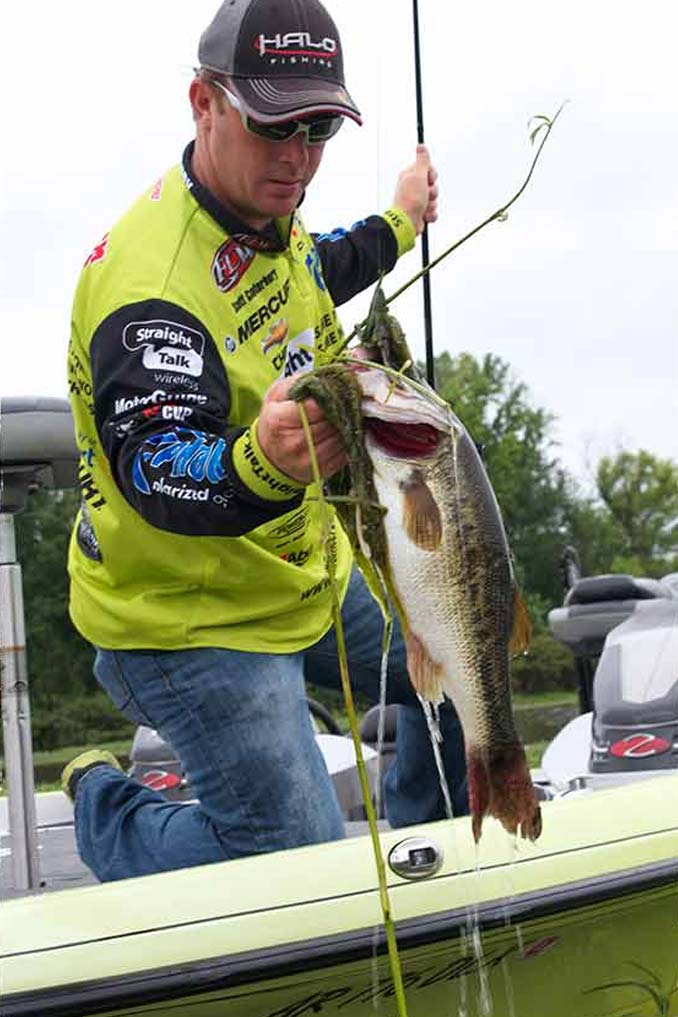
If you’re just getting in to fishing, or want to really improve your overall fishing technique, Straight Talk Pro Angler Scott Canterbury says you need to start fishing with soft plastic worms.
“Anyone getting into fishing should really try worm fishing. Top water fishing and crank bait fishing will come natural. The thing about worm fishing is that it takes feel to know when your bait is on the bottom, when your bait is in a brush pile, rocks and especially when a bass strikes.”
Learning how to fish these soft plastic baits will help you learn what to look for, and how your rod and real should feel when hitting different bits of structure. It’s hard to explain in an article, but the difference between being a good angler and a guy who is just catching fish by luck is the ability to really understanding what you’re feeling as you’re reeling in your line.
Start studying your local waterways and research different fishing techniques.
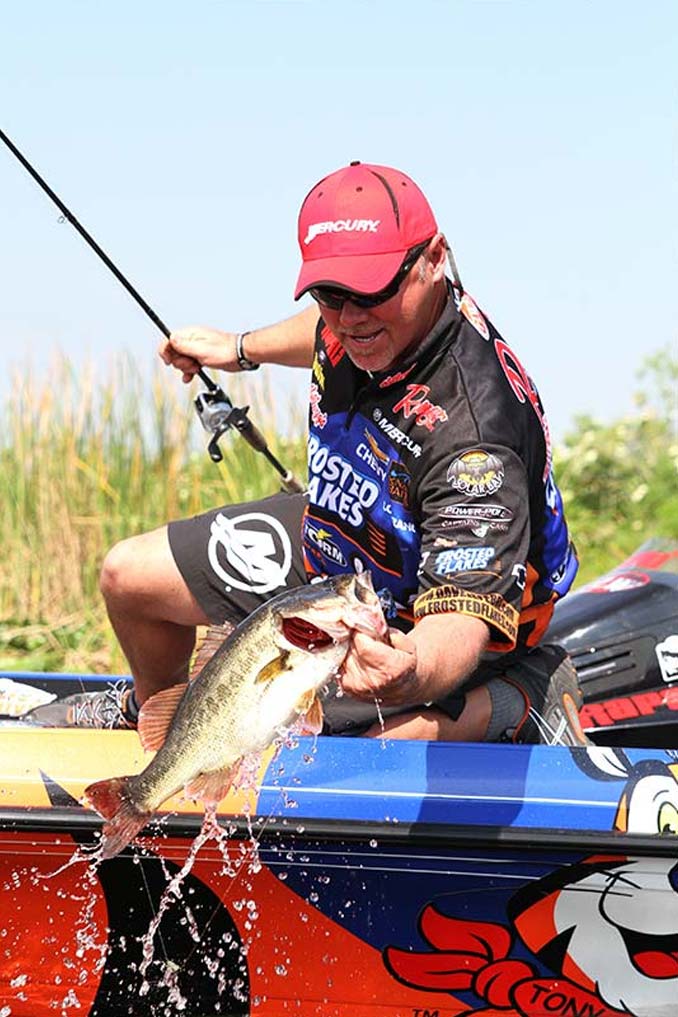
Even in large cities, there are numerous different spots where you can catch fish. From local rivers and streams, to small park and golf course ponds, start studying your local environment and take note of any areas that may contain fish, crawdads and frogs.
Kellogg’s Frosted Flakes pro angler Dave Lefebre tells us it’s all about figuring out patterns and using the resources that are already out there.
“The absolute best advice I can give is to simply use your resources. Every answer to any question you have, any technique you want to learn is available online. Watch videos, read articles, and keep your eyes on the tournaments too.”… “Patterns are the key more often than not because fish often move from even the perfect spots, but once you find that certain thing they are liking, you can keep covering water and fishing fresh places.”
Understand how Seasonal Changes can Effect Fish Behavior
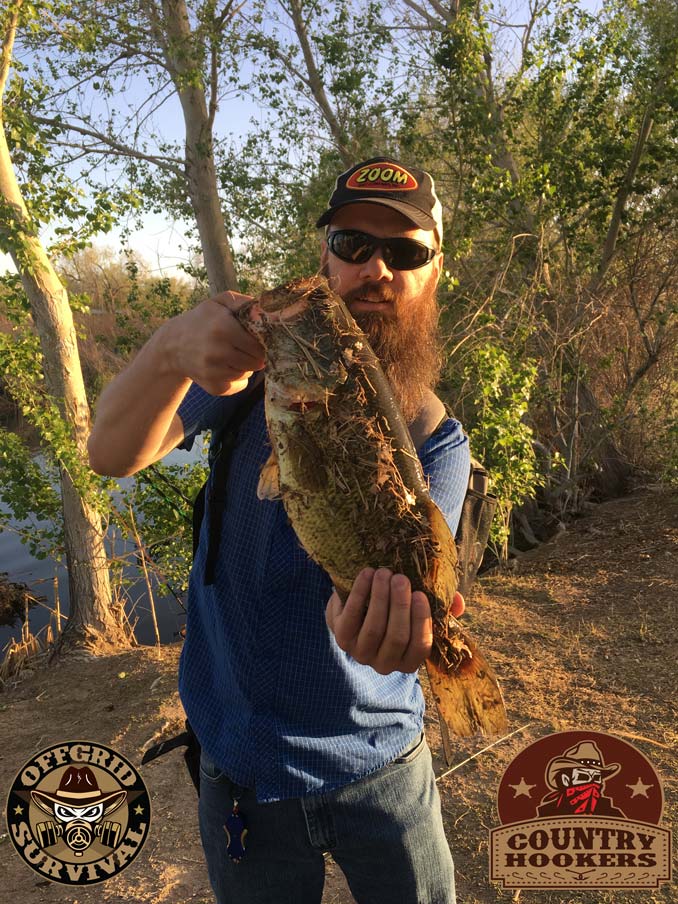
I fish year-round, so I know that seasonal weather patterns can have a huge effect on how I fish. For instance, during cold weather conditions bass will often become lethargic, causing you to tweak how you present the bait to the fish – often just slowing down your techniques can be enough to cause a bass to hit your bait during the winter.
Robert Richardson, owner of Offgridsurvival.com & CountryHookers.com shares his cold weather fishing tips:
The first thing you need to know about wintertime fishing is what happens to bass in cold weather. When the water starts to cool a bass’ metabolism starts to slow down, making them seem almost lethargic. For a fisherman that’s, not good news; unless you know how to trigger a strike.
While bass eat a lot less in the winter, they will strike when presented with the right bait, in the right way. In cold conditions that usually means slowing down retrieves, cutting down on the size of your bait, and using a little bit of finesse – not to mention a whole lot of patience.
Match the Hatch
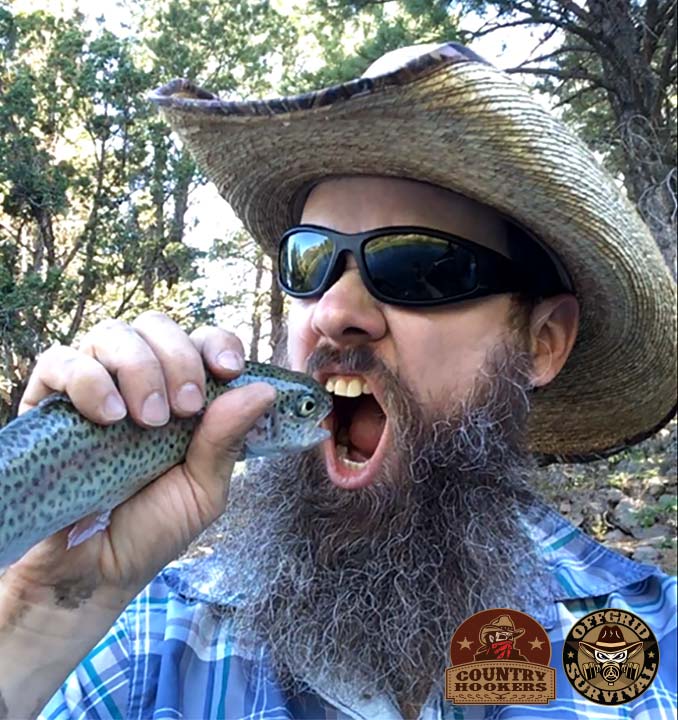
Another important thing to understand is what are the fish eating — this can very from day to day. For instance, when fly fishing, you’ll often hear people talk about matching the hatch. The saying comes from a fly-fisherman’s attempt to match what flies should be used to fool the fish into thinking its a natural insect — even things like where the insect is in it’s lifecycle are taken into count.
When hitting new waters, this can be figured out by taking a quick water sample so you know exactly what trout (or target fish) are eating; you can then mimic aquatic insects in their larvae, pupae, or nymph stages.
Passive Survival Fishing Techniques
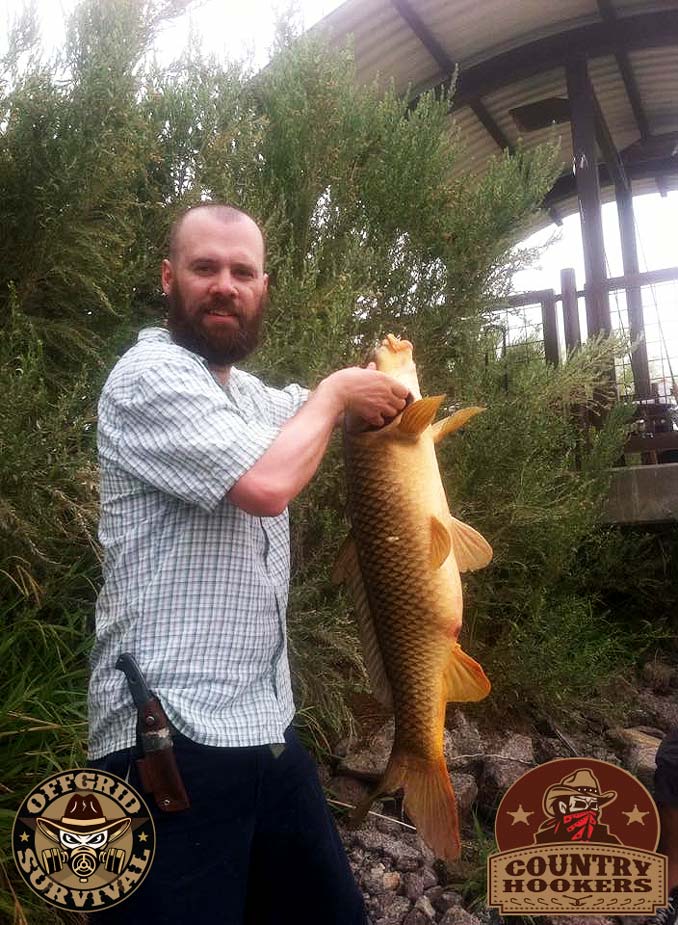
Trotline Fishing
During a survival situation, it’s important to do everything you can to increase your chances of catching fish; that means going beyond normal fishing methods and looking at passive fishing techniques and traps that can produce huge results. A great way to catch a lot of fish, without having to worry about constantly watching your line, is to set up a something known as a Trotline. Check out our article on how to make a Trotline.
Plastic Traps for Catching Bait Fish
To be successful with a Trotline, you are going to need to find a lot of bait. In an urban setting, building a fishing trap should be pretty easy — there’s usually plenty of garbage that can be used to build a makeshift bait trap. Check out my video on how to use ordinary plastic bottles to catch bait fish.




Don’t forget about learning to ice fish also.And smoking your catch.
o BS!!! survival fishing isn’t done with rod and reel. its a huge outlay of time with potentially marginal results. survival fishing is done with set hooks and traps. set them, walk away and do something else.
Fishing. This is something I did as a child. It is something a family can do together.
Survival fishing is not about rod and real. I went on a trip to Mexico many years ago and we bartered some 22 ammo and Bic lighters to use a locals fishing net and “launcha” which was just a leaky home built boat. Used a gill net across the Rio Concho and caught 20 or so fish for an all night effort. The big Gar fish were scary getting them out of the net. Staked them on a plank and roasted in front of a fire. Now that’s survival fishing.
Here in the UK beach fishing and rock fishing would be your best bet to keep your tummy filled. If you Include the larger islands surrounding the UK we have almost twenty thousand miles of coast line. Most of the remaining resources over here are coastal making it one of the few places to go if the SHTF.
Excellent tips listed here. Knowing how to fish is a skill that is worth its weight in gold during a survival situation. I find that the seasonal changes tend to have the largest impact on how fish bite. Thanks for sharing this valuable resource!
Now this is a survival tip that I can endorse…learning how to fish in whatever fashion makes a lot more sense than stocking your basement with a ton of crap that you couldn’t carry! Good article! I would like to see one on edible plants/herbs, etc., because even wild meat became very scarce during the Great Depression.
In a grid down situation the water that you are fishing from may not be any good and the fish may be contaminated, I would like to have seen some tips on that included with this article.
Don’t forget an old phone generator to “call” up the fish…currently not legal, but we are talking survival right?
Any help from fishermen! I have know idea how fly fish in mountains in CO. I see a heavy line with insect flies. Above this old girl how to do it, just a lake fisher. I can figure out illegal ways, but survival is the name of the game.
Still need help if I can buy property in mountains with a creek that carries trout. Don’t know how to fly fish, just a pond fisher from NE CO
Survival fishing, it depends on where you are at. My Dad use to tell about the fishing growing up next to the Jim river in the upper mid west during the late 20’s and early 30’s, how the river was nice and clear. Later when I was 10 or so, Mom and Dad caught a large cat fish in the mid to late 50’s ( and some crap, but that is another story ) from the Jim. but he put it in the stock tank for about three to four days. When I ask him why, his answer was so that the fish can get cleaned out. I didn’t understand him or what he was saying. Between the farm run offs of weed killers and bug killers and the way farming practices were being use then ( soil run offs = MUD ), so that is why that cat fish was put in the stock tank for however long it needed to clean itself ( so to speak ). And it has only gotten worse in the years since. But if a person is starving, then I guess it doesn’t really make any difference. Hmm, just saying